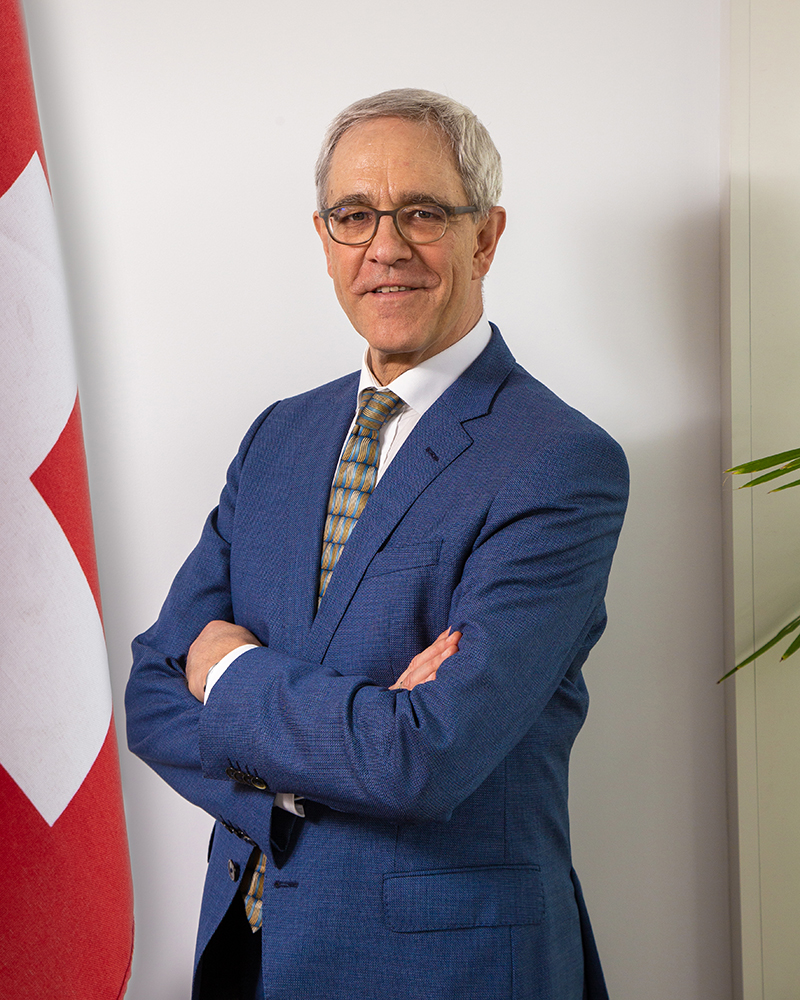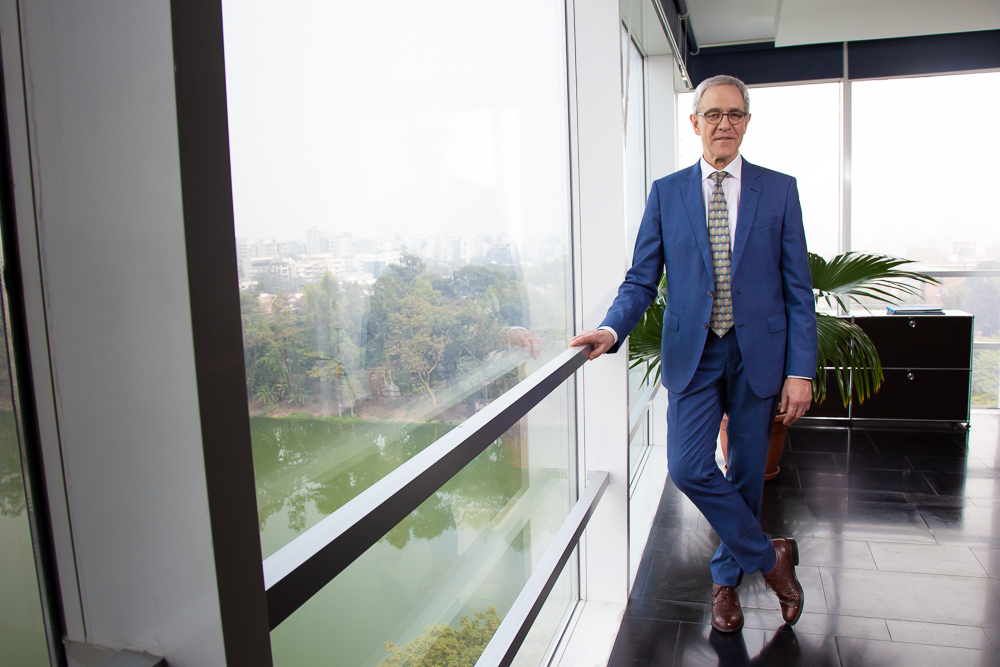Falling Head Over Heels for Bangladesh
Just about to conclude his assignment in Bangladesh, Swiss Ambassador René Holenstein looks upbeat, seems has a bagful of great memories as he was eager to share his experiences of Bangladeshi hospitality and friendly and enthusiastic people and candidly expresses his love for Bangladeshi food and culture in his encounter with Colors Advisory Editor Ziaul Karim.

Photographer: Kazi Mukul.
Ambassador René Holenstein can’t forget how he was received by the people when he first arrived in the country and really was amazed by the people and their brimming enthusiasm, particularly the youth. ‘My impression of the country is that it has been growing very fast economically and it is palpable in every sphere of life and living. Wherever I visited over two and a half years ago, people received me with great hospitality, openness and friendliness,’ he says.
Though he has never been to Bangladesh before his assignment as Ambassador, Bangladesh to him was one of the leading countries in the third world in the 1970s, as a member of the Non-Aligned Movement. The image was of a newly independent country, which has fought for its linguistic nationality.
The Ambassador mentions that he has been trying to convey to people in Switzerland that Bangladesh is a completely different country from what many people think it to be because it’s an extremely globalized country with high economic growth rate, with very open and friendly people. ‘Wherever you go, you meet people who have probably a family member who work abroad; they have influence from abroad. Even if I go to villages, I meet people who have family members abroad, who are sending back money and are well-connected to the world,’ he says nullifying perceptions of many people abroad that there’s a lot of violence and disasters. ‘So, all these prejudices are not true.’
Foods are something that gives Bangladesh a distinct character. ‘There’s almost no conversation without talking about food. Everywhere people talk about food and how it’s being prepared and what kind of different regional varieties of food and so on,’ he says with a broad smile. ‘I do like Khichuri. I like chicken biryani, of course everybody does. I like fish curry also.’
René Holenstein, who is about to end his tenure as the Ambassador of Switzerland, has visited many a place in Bangladesh. ‘I really liked visiting rural areas and talking to people. Also, I met people who live in difficult and dire conditions; I visited places where minority communities live, to understand their specific issues and challenges. So, I like the countryside.’
Asked about joining Bangladeshi festivals, the diplomat refers to the performance of Lalon singers from Kushtia. ‘It’s something close to real Bangladesh in the sense that it’s really expression of deep culture of Bangladesh even though unfortunately, I’m not able to understand the words,’ he says. ‘There’s this raw energy as you call it. What I also found totally amazing in Bangladesh is all these young people who are full of energy and enthusiastic about their daily life.’
Dwelling on Bangladesh’s pursuit of middle income dream by 2024, the Ambassador emphasizes infrastructure building, market development, promotion of agriculture sector, and improvement in service delivery including banking sector services. ‘In the future, good governance is the key to development of the banking sector of the economy. Otherwise it will be extremely difficult to achieve the dreams of Bangladeshis,’ he spells out. In this context, he mentions that Switzerland is giving supports to local government institutions so that they can provide better services to the people.
Speaking on the issue of Bangladeshi migrant workers, the diplomat says skills development is a priority for the country since skilled workers earn better and they are also more aware of rights in the countries of destination. Switzerland has undertaken a new programme to be implemented by a Swiss NGO to scale up skills of the Bangladeshi workers, who would be employed abroad. ‘We are also helping the Bangladesh government to reintegrate returnees… They are sometimes in extremely dire conditions and I have visited families who came back. Many of them are psychologically traumatized,’ he says.
René Holenstein has his first encounter with Bangladesh in the 1970s. ‘I was myself engaged in selling jute bags, which came from Bangladesh,’ he recalls. Two-way trade between the countries tripled in a decade to around US$750 million but the diplomat is not satisfied with the figure, which, he however hopes will be crossing US $1 billion by 2021. ‘It’s increasing and there’s an increasing interest from Switzerland in Bangladesh.’

Photographer: Kazi Mukul.
Switzerland is the one of a few countries that recognized Bangladesh immediately after independence in 1971 through a bloody war of liberation. The diplomat has pointed out that Swiss multinational companies and also small and medium enterprises have been present in Bangladesh since long and some of the MNCs started operations in the country even before independence. ‘There’s a long tradition of Swiss Bangladesh economic relations,’ he adds. New Swiss companies are coming to Bangladesh, although it may take some time for investors from Switzerland to invest in the country’s special economic zones.
‘There’s an increasing interest and I would like to mention that we had political visits in the last two and a half years. The Swiss President was here in February 2018. We had political consultations last year. We had another high-level visitor earlier this year… All these visits have contributed and are contributing to widening economic and political relations,’ he lists.
The diplomat reiterates appreciations Bangladesh received from some other countries for giving shelter to the Rohingya people from Myanmar. ‘Switzerland, one of early providers of humanitarian aid, highly appreciates the role Bangladesh has been playing over the last almost three years in hosting people from Myanmar,’ he says, adding that they also appreciate the role of the host community.
Politically, he goes on to say, Switzerland has been with Bangladesh in this crisis supporting the government. In its efforts to repatriate the Rohingya refugees – which is a priority – Switzerland maintains that there should be ‘conducive environment’ for the repatriation. ‘We have been very much engaged. The special Envoy of the UN Secretary-General is a Swiss Diplomat.’ Ambassador Holenstein is hopeful that the Rohingya population would go back although it may take a longer time, as he refers to the position taken by the international community including recommendation by the commission headed by former UN Secretary-General Kofi Annan.
While the Swiss diplomat was being photographed for the interview he guided my photographer colleague Kazi Mukul to rearrange the setup of his office room, requesting to be photographed at all possible corners of his office room that he has cherished in Bangladesh.




